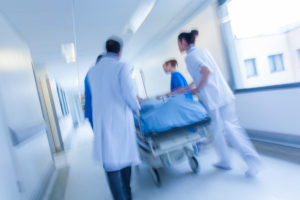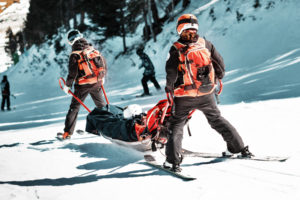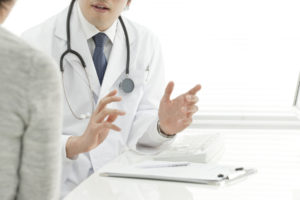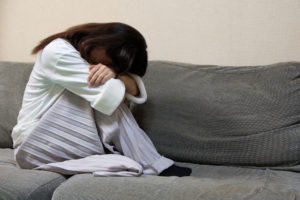Medical Services in Hakuba Valley
Medical Services in Hakuba Valley
 The Emergency number is Japan is 119. This will connect you to the fire department / paramedic services.
The Emergency number is Japan is 119. This will connect you to the fire department / paramedic services.
The on dialing this number the first thing the person who answers will say is:
“Kyukyu desuka, Kaji desuka”, which means is this a medical emergency or a fire.
If you want an ambulance, then say “Kyukyu desu” pronounced the same as the letter “Q”.
They will then try and establish your location, and the nature of the emergency. Things to remember here are that addresses in Japan do not mean much. It is easier for them to pinpoint your location from well known landmarks in town, so lodge names (as well as the previous name if a lodge has been renamed) are important, as are landmarks on street corners.
Ambulances in Hakuba are generally on the scene within 10-15 minutes if they can find your location. Unlike many other countries, paramedics are limited in the treatment they can give, and while very skilled at their jobs, they are not legally allowed to do many things that paramedics overseas can do (insert throat intubation etc).
On arrival at the scene the paramedic will assess the situation, and in nearly all cases transport the victim to a hospital. Paramedics are in constant contact with hospitals and their base. Unless it is a minor situation during doctor’s office hours, the ambulance will head south, out of Hakuba. At the time of departure, they may not know where they are heading. More often than not, they will be relaying the symptoms to their base center, who will be then trying to locate the closest specialist in accordance with the symptoms described by the paramedics, and also verify that the specialist is available.
In general, the closest general hospital is in Omachi, about 25km south of Hakuba, followed by Azumino (35km south of Hakuba), Hodaka (45km south of Hakuba) or even Matsumoto (65km south of Hakuba).
They will want someone to accompany the victim to the hospital, but they will warn against trying to follow the ambulance in a car.
Once at the hospital they will hand over to the specialist on duty. Most doctors do have some level of English, but it may be very technical.

If you are injured on a ski resort, then the ski patrol are the first responders.
They will assess the situation, transport you to the base of the resort (or call in a helicopter for extreme cases), and then either arrange an ambulance for you, or if the injury is not too serious, call a taxi for you.
Unlike other countries, ski patrol cannot give you pain relief.
They will try and make you as comfortable as possible, but the ride down the mountain may be painful.

There are a number of small clinics in Hakuba.
In some cases, they may request you bring a translator.
On Sundays and Public Holidays, the local clinics rotate being open.
So, there is always a doctor on duty during the day.
To find out the on-duty doctor, please call the town office on +81-261-75-5000.
Local doctors are able to assist with minor ailments and most have x-ray facilities, but if they feel it is beyond their facilities, then they will call and ambulance and have you transferred to a larger hospital with the facilities to treat your situation.
Some clinics dispense medicine directly, while others will write out a prescription that needs to be filled at a local pharmacy.
One thing to note is that many medicines in Japan have a different name to your home country, so knowing the generic name of any medicines that you are allergic to will help avoid being prescribed the wrong medicine.
 There are two large chain pharmacies in Hakuba.
There are two large chain pharmacies in Hakuba.
Matsumoto Kiyoshi is located behind the North Face store near Hakuba Station, while American Drug is located on route 146, about 400m south of the big supermarket.
There are also two pharmacies that specialize in prescriptions.
Ohta Pharmacy is located near Hakuba Station, while Fujinoya is located near Kamishiro Station.
Several clinics also issue their own medicines removing the need to get the prescriptions filled at a pharmacy.
Many people find that across the counter pain killers are not as strong as in other countries.
It can pay to bring aspirin and ibuprofen with you. Please note that opioids are banned in Japan, and even with a prescription you may encounter problems at the border.

While emergencies are high stress situations, which can be exacerbated due to the language barrier, Japanese medical staff are very professional.
And while information may not be flowing like it does in your home country, please remain calm.
Being calm will help both the victim and the medical staff, while adversely being demanding and tense will only make the situation worse.
- Take a few deep breaths to relax.
- Be concise and use simple language to communicate.
- Use a smartphone translation app to relay medical information.
 The Emergency number is Japan is 119. This will connect you to the fire department / paramedic services.
The Emergency number is Japan is 119. This will connect you to the fire department / paramedic services.
The on dialing this number the first thing the person who answers will say is:
“Kyukyu desuka, Kaji desuka”, which means is this a medical emergency or a fire.
If you want an ambulance, then say “Kyukyu desu” pronounced the same as the letter “Q”.
They will then try and establish your location, and the nature of the emergency. Things to remember here are that addresses in Japan do not mean much. It is easier for them to pinpoint your location from well known landmarks in town, so lodge names (as well as the previous name if a lodge has been renamed) are important, as are landmarks on street corners.
Ambulances in Hakuba are generally on the scene within 10-15 minutes if they can find your location. Unlike many other countries, paramedics are limited in the treatment they can give, and while very skilled at their jobs, they are not legally allowed to do many things that paramedics overseas can do (insert throat intubation etc).
On arrival at the scene the paramedic will assess the situation, and in nearly all cases transport the victim to a hospital. Paramedics are in constant contact with hospitals and their base. Unless it is a minor situation during doctor’s office hours, the ambulance will head south, out of Hakuba. At the time of departure, they may not know where they are heading. More often than not, they will be relaying the symptoms to their base center, who will be then trying to locate the closest specialist in accordance with the symptoms described by the paramedics, and also verify that the specialist is available.
In general, the closest general hospital is in Omachi, about 25km south of Hakuba, followed by Azumino (35km south of Hakuba), Hodaka (45km south of Hakuba) or even Matsumoto (65km south of Hakuba).
They will want someone to accompany the victim to the hospital, but they will warn against trying to follow the ambulance in a car.
Once at the hospital they will hand over to the specialist on duty. Most doctors do have some level of English, but it may be very technical.

If you are injured on a ski resort, then the ski patrol are the first responders.
They will assess the situation, transport you to the base of the resort (or call in a helicopter for extreme cases), and then either arrange an ambulance for you, or if the injury is not too serious, call a taxi for you.
Unlike other countries, ski patrol cannot give you pain relief.
They will try and make you as comfortable as possible, but the ride down the mountain may be painful.

There are a number of small clinics in Hakuba.
In some cases, they may request you bring a translator.
On Sundays and Public Holidays, the local clinics rotate being open.
So, there is always a doctor on duty during the day.
To find out the on-duty doctor, please call the town office on +81-261-75-5000.
Local doctors are able to assist with minor ailments and most have x-ray facilities, but if they feel it is beyond their facilities, then they will call and ambulance and have you transferred to a larger hospital with the facilities to treat your situation.
Some clinics dispense medicine directly, while others will write out a prescription that needs to be filled at a local pharmacy.
One thing to note is that many medicines in Japan have a different name to your home country, so knowing the generic name of any medicines that you are allergic to will help avoid being prescribed the wrong medicine.
 There are two large chain pharmacies in Hakuba.
There are two large chain pharmacies in Hakuba.
Matsumoto Kiyoshi is located behind the North Face store near Hakuba Station, while American Drug is located on route 148, about 400m south of the big supermarket.
There are also two pharmacies that specialize in prescriptions.
Ohta Pharmacy is located near Hakuba Station, while Fujinoya is located near Kamishiro Station.
Several clinics also issue their own medicines removing the need to get the prescriptions filled at a pharmacy.
Many people find that across the counter pain killers are not as strong as in other countries.
It can pay to bring aspirin and ibuprofen with you. Please note that opioids are banned in Japan, and even with a prescription you may encounter problems at the border.

While emergencies are high stress situations, which can be exacerbated due to the language barrier, Japanese medical staff are very professional.
And while information may not be flowing like it does in your home country, please remain calm.
Being calm will help both the victim and the medical staff, while adversely being demanding and tense will only make the situation worse.
- Take a few deep breaths to relax.
- Be concise and use simple language to communicate.
- Use a smartphone translation app to relay medical information.

